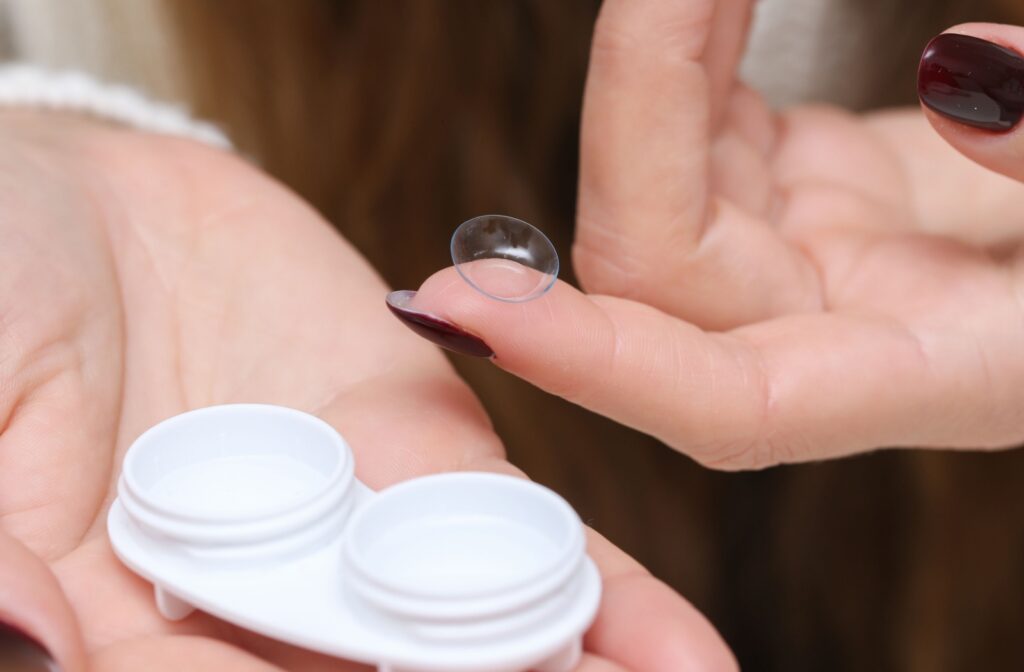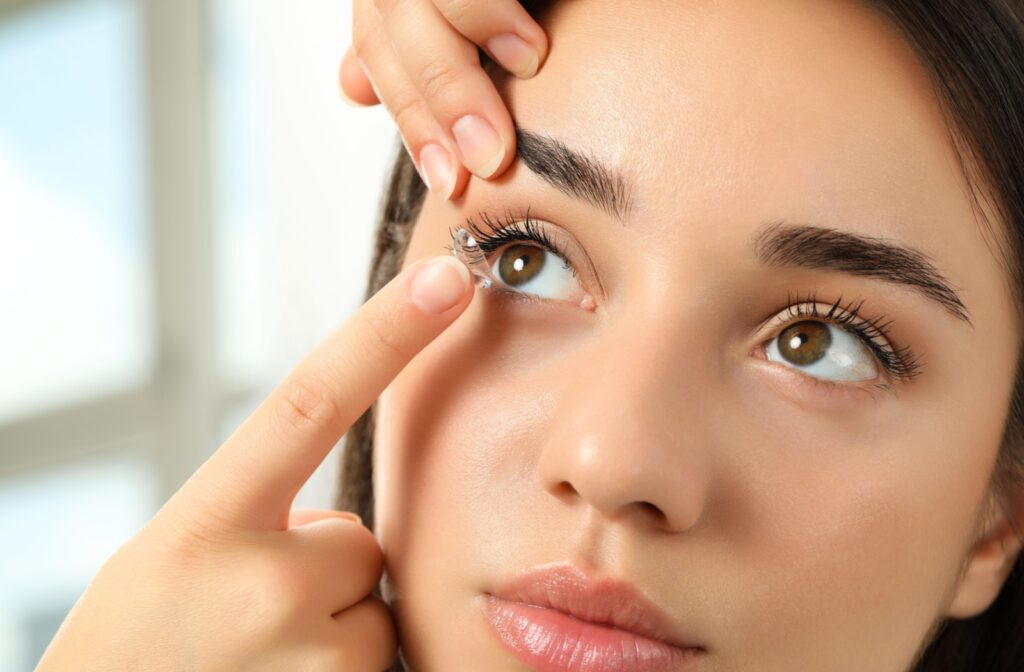Are you thinking about trying contact lenses but wondering if they’re suitable for you? Contact lenses are a game-changer for many, offering freedom from glasses while still improving vision. However, they’re not the best solution for everyone. Some medical and lifestyle factors may make them less effective or practical.
Contact lenses may not be suitable for people with medical conditions like allergies, blepharitis, or keratoconus, or those in certain work environments. People with dry eye disease may also struggle with contact lenses. If you have any concerns about wearing contact lenses, be sure to speak with one of our optometrists at Stonebridge Eyecare.
What Are Contact Lenses?
Placed directly on the eye’s surface, contact lenses are small discs that are used to correct refractive errors—a group of eye conditions that arise when light entering the eye doesn’t land correctly on the retina. Contacts are designed to help with conditions like myopia (nearsightedness), hyperopia (farsightedness), and astigmatism. There are many types of contact lenses, including hard, soft, and disposable types.
Convenient and practical, contact lenses are popular among people who prefer not to wear glasses and for active people who desire the convenience of not needing to wear glasses.
Benefits of Contact Lenses
Some key advantages of wearing contact lenses include:
- Better vision: Contact lenses are used to correct vision problems like nearsightedness, farsightedness, and astigmatism
- Convenience and comfort: Contacts don’t fog up, slip down your nose, or get in the way when exercising
- Ease of wearing other eyewear: It’s easier to wear sunglasses and ski goggles when you wear contact lenses
- Style: Some people prefer how they look without eyeglasses
Disadvantages of Contact Lenses
However, contact lenses come with a range of drawbacks as well:
- Robust hygiene: Proper cleaning and handling of your contact lenses is essential to avoid eye infections and other problems
- Discomfort: Some people find contact lenses uncomfortable
- Cost: Replacing contact lenses regularly, along with cleaning supplies, can add up over time
Certain medical conditions like allergies, dry eyes, or eyelid inflammation can make contact lenses unsuitable for some people. Some work environments are unsuitable too. Let’s explore these reasons in more depth.
Why Some People Can’t Wear Contact Lenses

Allergies
Allergies can cause red, watery, and itchy eyes, which can make contact lenses uncomfortable to wear. Worse yet, allergens like pollen can stick to lenses, which increases irritation. However, some people with allergies can wear daily disposable contact lenses. Eye doctors can also prescribe steroids, antihistamines, and mast cell stabilizers to help treat your allergy symptoms.
Susceptibility to Infections
If you’re prone to frequent eye infections, contact lenses might not be suitable for you. Wearing lenses increases the risk of infections, especially if you use extended-wear lenses, sleep in your contact lenses, or don’t clean your lenses properly. Frequent and serious infections can then lead to corneal scarring, which can have permanent effects on your vision.
People who get moderate to severe eye infections are generally told not to wear contact lenses and to wear eyeglasses instead. If you have symptoms of an infection, get medical help right away because some eye infections can lead to blindness.
Dry Eyes
Dry eye disease is when your eyes don’t produce enough tears or when the tears you produce don’t contain the correct chemical composition. Symptoms of this condition include burning and itching sensations, feeling like there is something inside your eye, and excessive tearing.
While mild to moderate dry eye can be manageable with special lenses or lubricating drops, severe cases can make lenses impractical.
Eyelid Inflammation (Blepharitis)
Blepharitis is an inflammation of the eyelids and is often caused by bacteria or skin conditions like dandruff. Blepharitis in the inner eyelid can lead to dry eyes, and blepharitis on the outside of the eyelid can put contact lens wearers at an increased risk of infection.
Treating blepharitis with warm compresses and gentle eyelid scrubs is often recommended before attempting contact lenses.
Keratoconus
Keratoconus is a condition where the cornea thins and bulges outward, creating a cone-like shape. This irregular corneal structure makes it difficult to fit standard contact lenses. However, eye doctors may suggest trying hard contact lenses. Other potential treatments are also available.
Workplace & Environment
Certain work environments, like those with excessive dust, chemical fumes, or low humidity, can be inappropriate environments for wearing contact lenses. Small particles or irritants can get trapped behind the lenses, which can potentially injure your cornea. Regular eyeglasses may be more practical in these environments.
In Canada, contact lenses are not allowed in some workplaces. Speak to your workplace safety supervisor if you have vision needs and work in a place unsuitable for contact lens wear.
Learn More About Contact Lenses at Stonebridge Eyecare
At Stonebridge Eyecare, we believe everyone deserves a comfortable and effective way to improve their vision. Whether you need regular eye exams or want to explore ways to control myopia, our team is here to answer your questions and help you find an eyewear solution.
Learn more about the team behind Stonebridge Eyecare, or better yet, book an appointment with us today.










